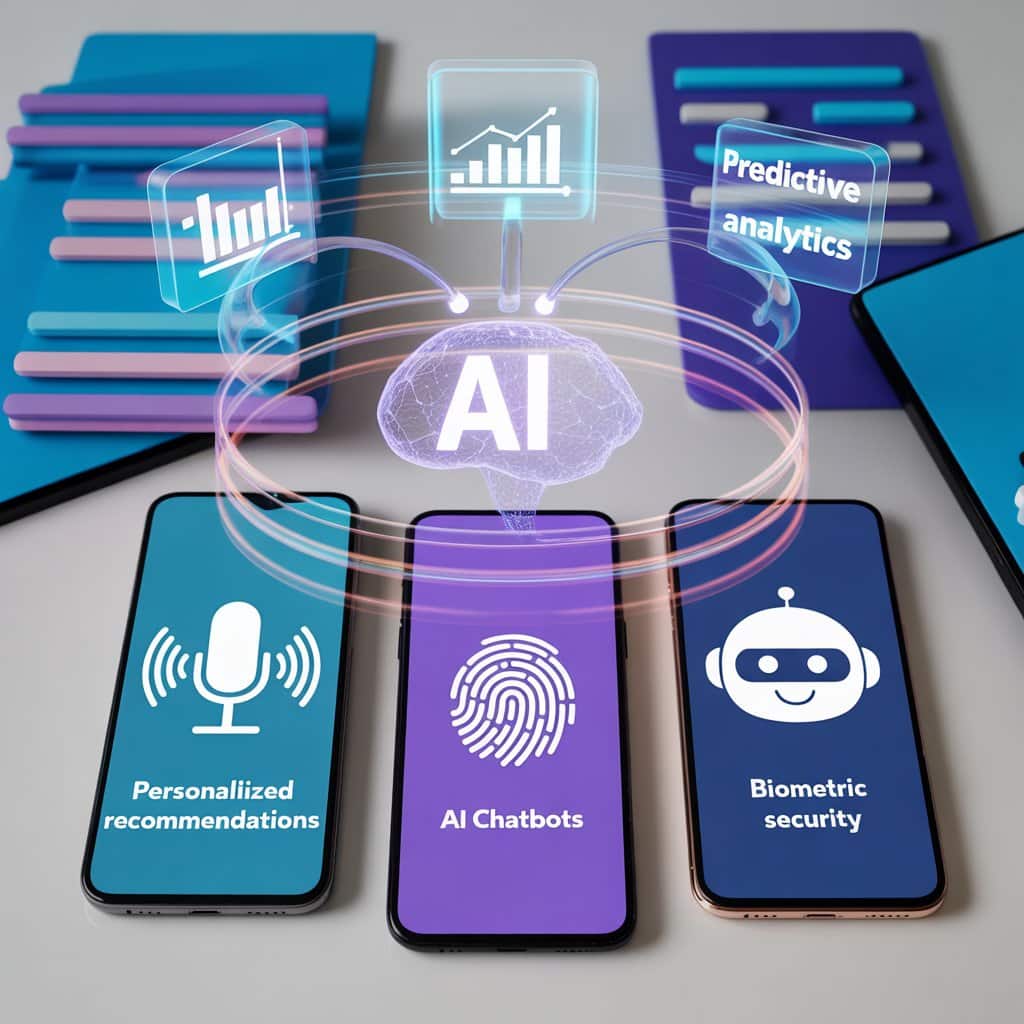
Artificial Intelligence (AI) is no longer just a buzzword—it has become the engine driving mobile app innovation. Whether it’s an AI Android app recommending your next favorite song, a chatbot answering questions instantly, or a fitness app tracking your health intelligently, AI is changing the way we interact with mobile devices.
From voice assistants like Google Assistant to biometric security features like Face ID, AI leverages machine learning (ML), natural language processing (NLP), and computer vision to create smarter, safer, and more engaging apps.
For businesses, AI-powered mobile apps mean better engagement, higher efficiency, and stronger customer retention. For users, it means apps that feel intuitive, responsive, and personal.
In this blog, we’ll explore how to use AI in mobile apps, its benefits, real-world examples, top AI apps in 2025, and future trends in AI for mobile OS.
What Does AI in Mobile Apps Really Mean?
When we talk about AI in mobile apps, we’re talking about apps that think, learn, and adapt. Unlike traditional apps that simply follow static instructions, AI-powered apps continuously analyze user behavior, predict needs, and deliver personalized experiences.
Consider Spotify. When you open the app, it recommends songs based on your listening history. Google Maps predicts traffic patterns before you even leave the house. These are practical applications of AI in mobile app development.
At its core, AI in mobile apps:
- Learns from user behavior
- Adapts in real time
- Analyzes massive datasets to detect patterns
- Provides instant insights and solutions
These capabilities make AI a must-have component for modern apps, whether on Android or iOS.
Key AI-Powered Features in Mobile Apps
AI doesn’t just make apps smarter—it makes them more interactive, secure, and engaging. Some key features include:
- Personalized Recommendations: Suggest products, music, or movies based on your preferences.
- Voice Assistants: NLP-powered assistants like Siri, Alexa, and Google Assistant.
- Biometric Security: Facial recognition, fingerprint authentication, and fraud detection.
- AI Chatbots: Provide automated support 24/7, answering queries instantly.
By embedding these technologies, businesses can enhance engagement, reduce churn, and deliver hyper-personalized services.

How AI Works in Mobile Apps
AI in mobile apps is powered by a combination of technologies that work behind the scenes:
Machine Learning (ML)
ML is the heart of AI in mobile apps. These algorithms process vast amounts of data, identify patterns, and learn from user actions. Over time, they become more accurate, offering predictive results and personalized recommendations.
- Example: Spotify suggests new songs based on your listening history.
Natural Language Processing (NLP)
NLP allows apps to understand and respond to human language, powering chatbots, virtual assistants, and translation tools.
- Example: Google Translate converts speech and text between multiple languages instantly.
Computer Vision
This allows apps to “see” and analyze images and videos.
- Example: FaceApp transforms selfies, and banking apps use AI to scan checks.
Predictive Analytics
AI can anticipate what users want before they ask.
- Example: Netflix recommends shows based on viewing patterns.
These technologies collectively make apps adaptive, intuitive, and capable of providing human-like interactions.
Core AI Features Driving Mobile Apps
Let’s explore the most impactful AI features businesses are leveraging:
- Natural Language Processing (NLP)
- Powers chatbots, voice assistants, and real-time translation.
- Business Impact: Enhances accessibility and engagement.
- Machine Learning Models
- Learns from user behavior to improve recommendations over time.
- Business Impact: Boosts engagement and conversions.
- Computer Vision
- Enables image and video analysis for security or creativity.
- Business Impact: Strengthens security and user experience.
- Predictive Analytics
- Forecasts user needs before they act.
- Business Impact: Increases retention and strategic planning.
- Recommendation Engines
- Suggests products, services, or content.
- Business Impact: Enhances sales and customer satisfaction.
Embedding these features ensures apps remain relevant, competitive, and highly engaging.
Benefits of AI in Mobile Apps
The integration of AI delivers tangible benefits for both users and businesses.
- Personalized User Experiences
Apps adapt to individual user behavior, offering relevant content, services, and suggestions.
- Example: Netflix curates unique watchlists.
- Business Value: Increases customer satisfaction and loyalty.
- Enhanced Security
AI enhances privacy and security through real-time threat detection and biometric authentication.
- Example: Face ID on iOS and AI-driven fraud detection in banking apps.
- Business Value: Protects user trust and prevents financial loss.
- Improved Search & Accessibility
AI-powered voice and image recognition make apps more intuitive and inclusive.
- Example: Google Lens allows searches by pointing the camera.
- Business Value: Expands user base by supporting diverse needs.
- Automated Customer Support
AI chatbots handle FAQs, order tracking, and troubleshooting, reducing dependency on human agents.
- Example: Banking apps with AI chatbots for instant query resolution.
- Business Value: Saves costs and ensures 24/7 availability.
- Data-Driven Insights
AI transforms user data into actionable insights for businesses.
- Example: E-commerce apps predicting purchase patterns.
- Business Value: Enables better decision-making and targeted marketing.
Best Artificial Intelligence Apps for Android in 2025
Artificial Intelligence has turned Android apps into more than just tools—they’re now companions, advisors, and assistants that anticipate user needs. In 2025, the app ecosystem is dominated by AI-powered apps that simplify everyday life, boost productivity, and enhance entertainment.
Here are the most popular AI Android apps in 2025, explained in detail:
The Leading AI-Powered Voice Assistant
Google Assistant remains one of the most advanced AI Android apps. It uses Natural Language Processing (NLP) and machine learning to provide personalized responses, automate tasks, and integrate with smart devices.
- Features: Voice search, smart home control, calendar reminders, language translation.
- Use Case: Say, “Hey Google, remind me to pay electricity bill at 6 PM,” and it sets an instant reminder.
- Why It’s Popular: Deep integration with Android OS makes it almost a default AI companion for millions of users.
An AI Chatbot Designed for Emotional Support
Replika is more than just a chatbot—it’s an AI friend that provides emotional support and companionship. The app uses NLP and deep learning to simulate meaningful conversations.
- Features: Chatting, voice calls, journaling, mood tracking.
- Use Case: A user feeling stressed can chat with Replika for relaxation and motivation.
Why It’s Popular: With mental health awareness on the rise, Replika offers comfort and non-judgmental companionship.
Famous for Its Photo-Editing Capabilities
FaceApp continues to be one of the most viral AI apps for Android due to its AI-powered photo editing tools. It uses computer vision and deep neural networks to transform selfies with incredible accuracy.
- Features: Age transformation, gender swap, hairstyle changes, smile enhancement.
- Use Case: A user uploads a photo and instantly sees how they would look 20 years older.
- Why It’s Popular: Simple interface + advanced AI makes it appealing for fun and creative content.
Improves Writing with AI Grammar Checks
Grammarly Keyboard integrates directly into Android devices, making writing emails, messages, and documents error-free. It uses AI-driven grammar correction and predictive text suggestions.
- Features: Grammar checks, spelling correction, style suggestions, tone detection.
- Use Case: While typing a professional email, Grammarly suggests better sentence structures and tone adjustments.
- Why It’s Popular: It helps both students and professionals improve communication skills instantly.
AI-Based Productivity Assistant
Although Microsoft scaled down Cortana in some regions, its AI-powered productivity tools still thrive as an Android app for professionals.
- Features: Task reminders, meeting scheduling, syncing across Windows devices.
- Use Case: Cortana reminds you of a meeting scheduled in your Outlook calendar while you’re on your Android phone.
- Why It’s Popular: Seamless integration with Microsoft Office and Windows ecosystem.
AI Conversational App for Personal and Professional Use
ChatGPT Mobile is one of the most widely adopted AI apps for Android in 2025. Powered by advanced language models, it serves as a conversational partner, research tool, and productivity booster.
- Features: Writing assistance, brainstorming, coding help, study support.
- Use Case: Students use it for essay drafting, while businesses use it for customer query automation.
- Why It’s Popular: Versatile, fast, and applicable across education, business, and daily communication.
Augmented Reality Filters Powered by AI
Snapchat’s AI filters combine computer vision and augmented reality (AR) to create real-time effects on photos and videos.
- Features: Face-mapping filters, voice-changing effects, interactive AR experiences.
- Use Case: A user records a video with an AI-powered lens that adds 3D animations synced with facial movements.
- Why It’s Popular: Fun, engaging, and constantly evolving, Snapchat AI filters keep the younger generation hooked.
The Impact of AI Apps on Daily Life
These best artificial intelligence apps for Android are redefining mobile experiences by:
- Automating routine tasks.
- Improving communication and productivity.
- Enhancing creativity with AI-powered tools.
- Offering emotional support and companionship.
- Making smartphones smarter, more personal, and user-friendly.
As 2025 unfolds, the rise of AI Android apps will continue to shape how people work, connect, and entertain themselves—making AI not just a feature, but the foundation of mobile technology.

How to Use Artificial Intelligence in Mobile Apps
- Choose the right AI model (ML, NLP, or Computer Vision).
- Integrate AI APIs or SDKs like TensorFlow Lite, Core ML, or Dialogflow.
- Test with real users to fine-tune performance.
- Optimize for device performance to ensure smooth functioning.
- Launch and monitor usage to continuously improve.
At EiBS, we guide businesses through each step, ensuring AI features are practical, scalable, and user-friendly.
Future of AI in Mobile App Development
Emerging trends include:
- Voice-First Interfaces: Navigate apps entirely by voice.
- Emotion Recognition AI: Apps adjust based on mood.
- Predictive Apps: Open automatically according to user routine.
- AI Cybersecurity: Detect threats in real-time.
- AR + AI Fusion: Immersive mobile experiences.
Experts predict AI will make apps smarter, safer, and more intuitive while helping businesses remain compliant and competitive.
Challenges of AI in Mobile Apps
AI adoption comes with challenges:
- Data Privacy Concerns – Users are wary of how data is used.
- High Development Costs – Skilled developers and AI infrastructure are expensive.
- Performance Limitations – AI can impact battery and storage.
- Algorithm Bias – Poor training data may lead to inaccurate predictions.
Businesses must adopt responsible AI practices to balance innovation and trust.

Conclusion
AI has redefined mobile app development. From personalized recommendations to fraud detection and 24/7 chatbots, AI is integral to modern mobile experiences.
For users: smarter, more secure, and personalized interactions.
For businesses: actionable insights, higher retention, and a competitive edge.
At EiBS, we help businesses embed intelligence into mobile apps, ensuring technology delivers real-world impact and growth.
The future is clear: AI-powered apps are no longer optional—they are the standard of mobile innovation.


